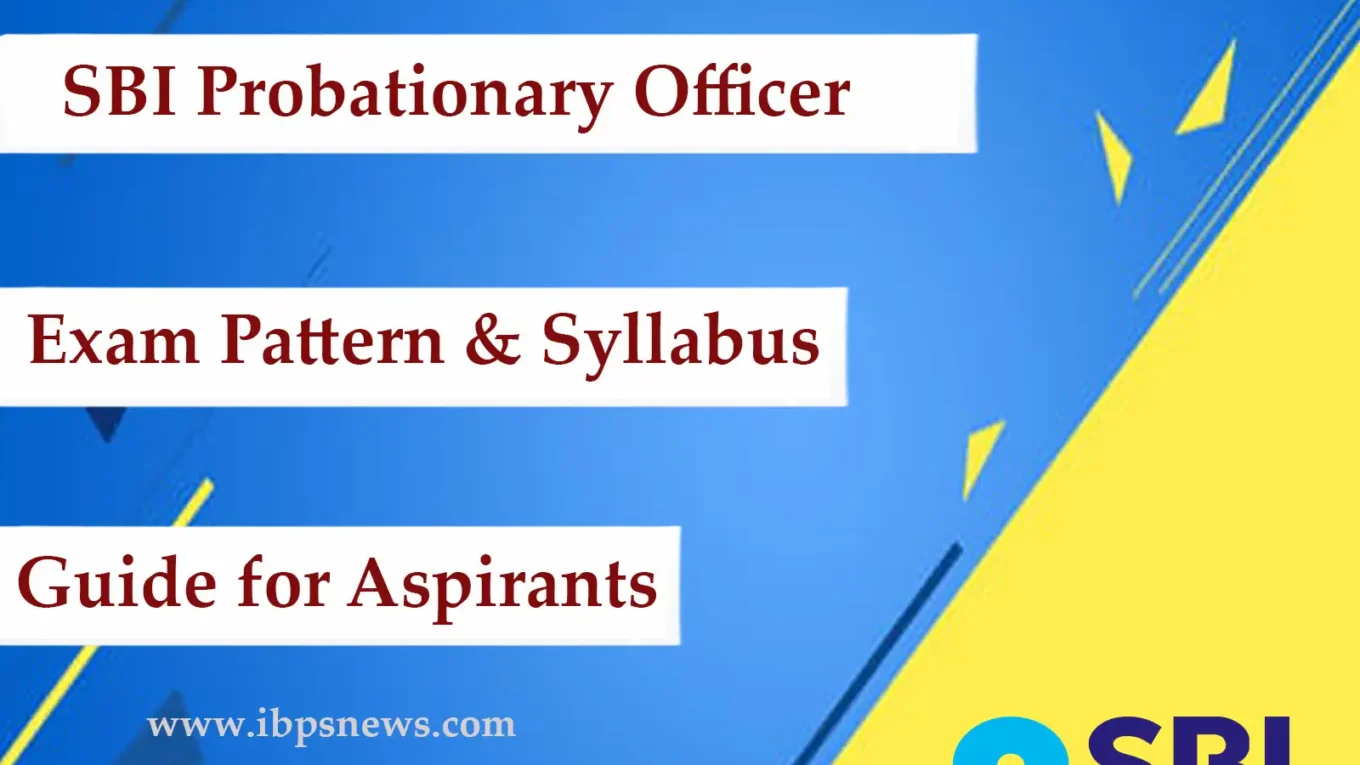Syllabus 2025 SBI PO Exam Pattern
For those hoping to work in banking across India, the highly sought-after State Bank of India (SBI) Probationary Officer (PO) test is Good preparation depends on knowing the exam schedule and syllabus. Ensuring students are well-informed and ready to face the SBI PO Exam Pattern and Syllabus for 2025, this article offers a thorough summary of them.
Summary of SBI PO Inspection
Three phases comprise the SBI PO selection process:
Initial Review: A qualifying test to rank Main Examination applicants.
Main Examination: Objective and descriptive elements combined in a thorough evaluation.
The last stage to assess a candidate’s fit for the post is group exercises and an interview.
Phase I: Initial Consultation
A screening test is the Preliminary Examination. Although its marks are not included into the final merit list, qualifying is necessary to advance to the Main Examination.
Mode of Examination: Online
Period: one hour.
Type: goal
There are one hundred total questions.
Marks total: 100
English Language: Thirty questions, twenty minutes
Twenty minutes for thirty-five questions on quantitative aptitude.
Reasoning Ability: Twenty minutes, 35 questions
Note: Every wrong response receives a 0.25 mark penalty.
English Language Syllabus
1.Reading comprehension cloze test fill in the blanks para jumbles error Spotting Sentence Improvement Vocabulary (Synonym and Antonym)
Aptitude in Quantities: Series of Numbers
Simplicity/Approximation
Translation of Data
Quadratic Formulas
Gain & Loss
Combining and alliterations
Both simple and compound interest
Work and Time
Time, Velocity, Distance: Speed
Proportion and Ratio
Proportional
mensuration
Capability of Reason: Problems Arrangements for Seating
Comparisons
Syllogism in coding-decoding
Direction Sense in Blood Relations: Order and Ranking
Alphabetic Series Input:
Phase II Main Examination Logical Reasoning
The Main Examination consists in objective and descriptive examinations and assesses applicants’ in-depth knowledge.
Exam pattern objective test:
Mode: Online
Three hours make up the duration.
total questions: 155
Two hundred marks overall.
Topics: Computer Reasoning 45 questions, 60 marks, 60 minutes as aptitude
Data Interpretation & Analysis: 45 minutes, 35 questions, 60 marks
General, Banking, and Economic Policies Awareness: 40 questions, 40 marks, 35 minutes
English: 40 questions, 40 marks, forty minutes
Descriptive test: Mode: Online (typing)
The duration is thirty minutes.
2 total questions.
50 total marks.
Content: Letter Writing and Essay; Note: Each wrong answer on the objective test results in a 0.25 mark penalty. First syllabus: reasoning and computer aptitude Problems with Sitting Positions
Data Completeness
Syllogism – Input – Logical Reasoning
Blood Relations: Direction Sense for coding-decoding
Fundamentals of Computing
Online and Networking
Suite 2 for MS Office Tools Interpretation and Data Analysis: Table, Pie Chart, Bar Graph, Line Graph Data Interpretation
Probability, data sufficiency, permutation and combination
Orders and Series
Knowledge of General/Economy/Banking: Current affairs, both national and international
Financial awareness and banking
Economic News Static General Knowledge Significance of Government Plans
Recent resignations and appointments
English is the language used here. Reading Competency
Language and Grammar and Vocabulary
Verbal ability; sentence correction in grammar
Para Jumbles Closure Test Descriptive Test: Writing an essay about modern subjects
Phase III: Group Exercises & Interview; Formal and Informal Letter Writing
Shortlisted candidates for the last phase are those who pass the Main Examination. Group Activities: Twenty marks
Interview: thirty marks.
Note: Shortlisting applicants for this phase considers the Main Examination’s overall marks—both objective and descriptive. Phase III marks are included to Phase II marks for the final merit list. Guideline for Preparation
Know the exam pattern. Learn the organization and marking system of every phase.
Make a study plan. Set aside time for every topic, paying particular attention to weaker ones.
Practice consistently. Review past years’ papers and practice on simulated tests to increase accuracy and speed.
Remain current. For banking news and current affairs, routinely read newspapers and follow reliable news sources.
Improve your typing ability. Work on typing to effectively control the Descriptive Test.
Commonly asked questions, or FAQs
Q1: Exists a sectional cutoff in the SBI PO Preliminary Examination?
A1: The Preliminary Examination lacks a sectional cut-off. To qualify for the Main Examination, candidates must, nevertheless, pass an overall cutoff.
Q2: Does the final choice take consideration for the Preliminary Examination marks?
A2: The Preliminary Examination qualifies in kind only. Its marks count not toward the final merit list.
Q3: Should incorrect responses on the SBI PO tests result in penalties?
A3: 0.25 marks are deducted for every wrong response in the objective tests of both the preliminary and main exams.
Q4: Can I select the Descriptive Test’s language?
A4: The Descriptive Test has English only writing requirements.
Q5: How were the last choices for the SBI PO decided upon?
A5: The final choice is based on the marks gained in the Group Exercises & Interview together with the Main Examination (Objective and Descriptive Tests).
Q6: Is the SBI PO selection procedure equipped with a psychometric test?
A6: Indeed, candidates ranked on Phase III undergo a psychometric test designed for personality profiling. Its performance is given to the interview panel, nevertheless, and it does not have marks.
Q7: Under the General/Economy/Banking Awareness part, which subjects address?
A7: Current affairs, banking and financial awareness, economic news, stationary general knowledge, significant government initiatives, and most recent appointments and resignations comprise this area.
Q8: In what ways may I raise my Descriptive Test performance?
A8: Concentrating on organization, clarity, and grammar, routinely practice essay and letter writing on a variety of subjects.

